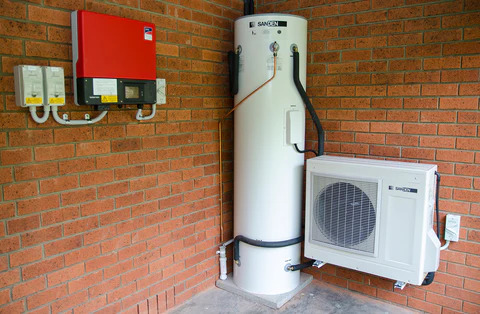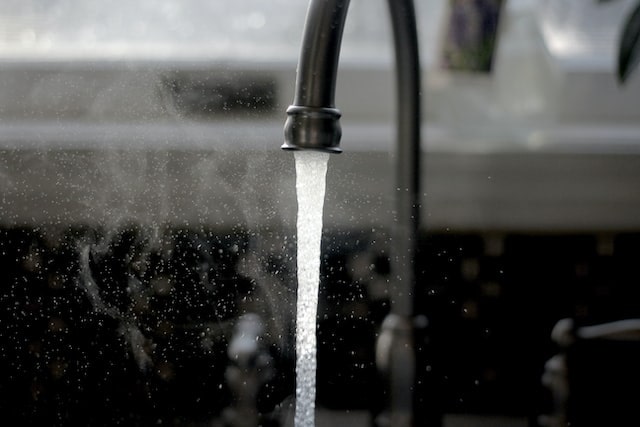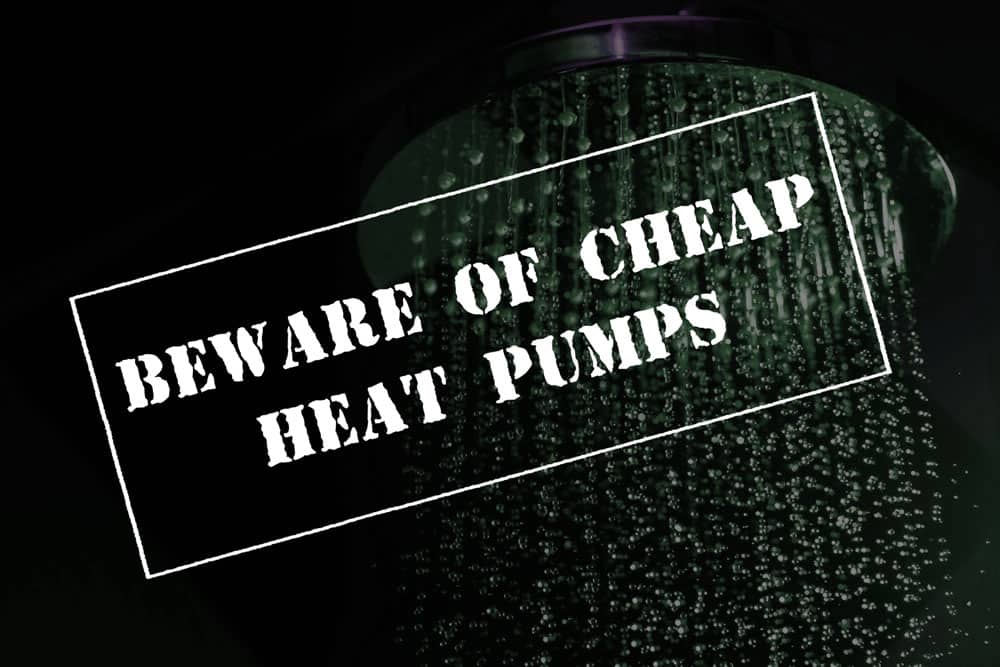Looking to upgrade your hot water system and considering a hot water heat pump?
There’s no doubt that switching to a heat pump system is an energy efficient choice that will save you money in the long term. However, currently in Australia, heat pump water heaters are relatively unknown, making up only around 3% of hot water heaters in use. But, this is rapidly changing as more and more people learn about the many benefits and look to switch their existing or aging hot water systems to a more environmentally friendly and cost-effective option.
So, what makes hot water heat pumps a great choice? The biggest benefit is their energy efficiency, which is good for your back pocket and for the environment. Their advanced design means they will also last longer than most standard electric or gas hot water systems on the market.
Heat pump technology is certainly an exciting innovation that will help thousands of Australians to reduce their home’s carbon footprint – but is it the right option for you? Check out our ultimate guide to hot water heat pumps to find out!
Why are hot water heat pump systems different?

Hot water heat pumps, also known as “air source heat pumps”, operate very differently to other water heating systems. Where traditional electric storage tank systems work in a similar way to a kettle, using electricity alone to power the heat element, hot water heat pumps work more like a reverse cycle air conditioner when it’s in heating mode, or like a refrigerator in reverse, extracting heat from the outside air and using a refrigeration cycle and heat exchange system to heat the water in the tank.
In essence, a heat pump system runs on solar power, as the warm air outside is heated by the sun. Electricity is only used to power the evaporator fan and compressor, significantly reducing the amount of energy it takes to heat water in the tank.
How do heat pump hot water systems work?
The following four-step process briefly sums up how heat pump systems operate and explains how they are able to heat your water so efficiently:
- The surrounding air is pulled into the heat pump system’s evaporator
- The warm air mixes with a special refrigerant inside which turns it to gas
- The gas is pumped through the compressor then on to the condenser
- This process generates heat and acts as a heat exchanger, circulating it through the system.
The ability to utilise a passive element such as the outside air allows heat pump systems to reduce their reliance on electricity and operate far more efficiently than traditional hot water systems. However, not all systems are equal! When choosing the right one for you, be sure to ask about the recovery rate of the heat pump, as this is how fast your unit will heat the next batch of water. A high quality pump such as a Reclaim 180L system will actually deliver more hot water faster than a less expensive Medea 360L system, even though its tank is half the size. This means you’re less likely to run out of hot water and is a great example of the long-term value of buying a quality system over a cheaper counterpart.
What type of heat pump hot water systems are available?

There are essentially two types of heat pump hot water systems: integrated systems and split systems. In an integrated system the heat pump’s major components (including evaporator, fan, compressor and condenser) are located at the top of the storage cylinder.
Split systems on the other hand are two separate units, much like a split system air conditioner, with the evaporator, fan and compressor connected to the storage tank via refrigerant pipes. In addition, there are also a range of different heat pump sizes available, so be sure to discuss your needs with your installer so that you get the best size for your family and climate.
How energy efficient are heat pump systems?
Heat pump systems use significantly less power than traditional hot water systems, making them a great choice for those looking to minimise their environmental footprint. In a traditional electric hot water system, electricity is used to heat the water, while a heat pump system uses electricity only to power the fan and compressor. This slashes the amount of electricity required, with hot water heat pump systems typically using 60 to 75 per cent less electricity than a conventional system.
As water heating accounts for around a quarter of energy use in the average Aussie home, making the switch to a heat pump system is an important step to improving the energy efficiency in your household. Of course, if you have solar panels installed too, you will reduce your home’s carbon footprint and electricity bills even more.
What are the key benefits of heat pump systems?

With their eco-friendly elements, advanced operating technology and durability, hot water heat pump systems bring many benefits, making them a smart choice for households across Australia. The key benefits include:
Reduced running costs: There’s no doubt the energy efficiency of hot water heat pump systems is good for the planet, but it will also save you plenty of money over time too. Plus, if you have solar panels installed, the savings will be amplified. With the rising cost of electricity, choosing energy efficient appliances for your home is more important than ever and can be a major factor in stretching your budget further.
Low maintenance: When you choose a quality system and have it installed by a professional, hot water heat pumps require very little maintenance. General checks on the elements can be completed by the homeowner as needed, with a scheduled maintenance check by a professional only needed every 3 to 4 years.
Longer lasting: The simplified operating process and smart design features give quality hot water heat pumps a longer lifespan than traditional systems. In fact, a quality heat pump hot water unit that is installed and operated correctly should last you upwards of 20 years.
Less carbon emissions: Heat pump units use around 75% less power to run than standard electric or gas hot water systems as they utilise the surrounding air to heat water, only using electricity to operate the internal parts. With heating water accounting for around 25% of your home’s energy usage, installing a heat pump system will significantly reduce your carbon emissions and your household’s environmental footprint.
What are the drawbacks?
While heat pumps are a fantastic choice for most Australians, like anything, there are some drawbacks in certain situations. These include:
Upfront cost can be higher: When you purchase a quality hot water heat pump system, it is likely that the upfront purchase price will be higher than a standard hot water unit. However, keep in mind that the long-term savings of using less energy will more than make up for the extra spent upfront.
May not operate as effectively in cold weather: There are certain types of heat pump systems that can struggle to operate at maximum efficiency in cold weather, and in some climates the internal components can even become damaged. There are upgrades that can be added to work around this issue, and your expert installer can discuss the options that will best suit your needs before you buy.
Installation process is complicated: The installation of heat pump systems is a little more complicated than your standard hot water unit, as the positioning of the unit and surrounding climate both play an important role in how effectively the system works. For this reason, it’s essential to only trust a qualified and registered professional to install your hot water heat pump system.
Noise levels can be an issue: While in operation, certain hot water heat pump systems can be noisy. This is another reason why strategic positioning during installation is important. Where possible, avoid placing the external units outside bedroom windows or in a position that will impact your neighbours.
Are heat pump hot water systems expensive?

The cost of a hot water heat pump system will vary significantly, depending on the make, model, brand and quality of the unit. Recently, we have seen a spike in the number of “free” or “cheap” hot water heat pump units in the market, but in our experience, these offers are too good to be true. The problem with these cheap offers is that the systems are often poor quality, and are prone to breaking down sooner. On top of this, they generally don’t work as well, so you are not getting the maximum efficiency from your heat pump unit, which means the operating costs are higher, and you won’t enjoy the same savings as you would from a quality unit.
So, with this in mind, be sure to consider the bigger picture when choosing your unit. While you might pay less for “cheap” systems, you may find yourself paying more in the long run once you factor in the cost of operation, repairs, or even a full replacement of the system.
Find out how much it would cost to upgrade your home to a hot water water heat pump.
Are rebates or grants available to offset the cost?
There are a number of ways you can offset the cost of a heat pump hot water system, with various rebates, grants and interest-free loans available throughout Australia. These are broken down state by state below, however, as things can change over time, we recommend you check with the relevant authority in your state or use the rebates and assistance page on the Australian Government Department of Climate Change, Energy, the Environment and Water website to find out about the current financial incentives on offer. It’s also worth keeping in mind that rebate systems such as those described below do tend to decrease over time, so be sure to act fast to maximise your savings.
Federal government heat pump rebates
At a federal level, the Small-scale Renewable Energy Scheme is available to individuals and small businesses to install eligible renewable energy systems such as solar panels and air source heat pumps. The scheme is in place to support the Renewable Energy Target and for households this operates via the creation of Small Scale Technology Certificates (STCs). The value of STCs you can receive varies depending on the type, size and model of your system and on your Geographical Zone of Residence, but in many cases, when you install an eligible heat pump hot water system the benefit you receive can equate to cost savings of thousands on the purchase price.
Heat pump rebates in Victoria
If you live in Victoria, there are two state government incentives that apply to energy efficient hot water systems. The solar and heat pump hot water system rebate provides eligible Victorian households with $1000 to put towards the initial costs of a heat pump or solar hot water system. The Victorian Energy Upgrades program provides special offers and discounts on selected heat pump hot water systems, and at the time of writing, when you replace an inefficient electric water heater with a heat pump, you can expect to receive a rebate of between $840–$1260, depending on the size of the unit through this scheme.
Heat pump rebates in New South Wales
Currently, there are no state government rebates available in New South Wales for heat pump hot water systems, but NSW residents can apply for national STCs as part of the Small-scale Renewable Energy Scheme.
Heat pump rebates in the ACT
If you live in the ACT, have a gas or electric hot water system and have an electricity plan with ActewAGL, you may be eligible for the Energy-efficient Electric Water Heater Upgrade which offers rebates of $750 off the purchase price of new heat pump systems. The Sustainable Household Scheme also provides ACT residents with no interest loans of $2000 to $15,000 to buy energy efficient products including heat pumps. The sustainable home upgrade rebate of $2500 is also available to eligible pension and concession card holders to help with the cost of upgrading to a heat pump system in the home.
Heat pump rebates in Queensland
Currently, there are no state government rebates available in Queensland for heat pump hot water systems, but residents can apply for STCs as part of the federal Small-scale Renewable Energy Scheme.
Heat pump rebates in South Australia
In addition to the federal STCs scheme, South Australian residents (particularly those in a low income bracket) may be eligible for the Retailer Energy Productivity Scheme. To access the scheme, residents can contact participating energy retailers.
Heat pump rebates in Western Australia
Currently, there are no state government rebates available in Western Australia for heat pump hot water systems, but the national Small-scale Renewable Energy Scheme is available to eligible residents.
Heat pump rebates in Tasmania
Tasmanian residents can register their interest in the upcoming Energy Saver Loan Scheme which will provide no-interest loans to eligible households to offset the cost of purchasing energy efficient upgrades. In the meantime, residents can apply for STAs under the federal Small-scale Renewable Energy Scheme.
Heat pump rebates in Northern Territory
Like, NSW, WA and QLD, there are currently no state government rebates available in the Northern Territory for heat pump hot water systems, but residents can apply for STCs via the Small-scale Renewable Energy Scheme.
Is a hot water heat pump system right for you?
Replacing your hot water system is a big decision and there are some key questions you must ask to be sure you make the best choice. It’s clear that for most Australian households choosing an energy efficient heat pump hot water unit will have a positive impact on the environment and will save you money in the long run. Plus, if you are eligible for a federal or state government rebate, the cost savings will be amplified. To find out if it’s the right choice for you, contact us to find your local registered heat pump installers or get a free online quote today.


